"The Cartel:" D+
Whoever gave news reporter-turned-director Bob Bowdon a camera and a tutorial in iMovie should be punished. His patronizing, ethically bankrupt documentary “The Cartel” serves as a train wreck of an example for aspiring documentarians to use as a complete antithesis for the type of work they should be making.
Bowdon has certainly bit off more than he can chew. For his debut documentary, Bowdon tackles the crisis of America’s failing public school system with the aesthetic delivery of a PowerPoint presentation and the abrasive tone of a local television news report. The film weaves a convoluted web of narrative that fuses interviews, bizarre graphics and B-roll in a haphazard, messy manner, then completely undermines both its sense of sophistication as well as its bipartisanship — two vital components of a successful documentary.
Bowdon studies student dropout rates, reading and mathematical proficiency levels, and the intricacies of public school board staff through only the state of New Jersey. The Garden State has always been regarded as a beacon of American public school education, as it allots the most amount of money on a per-pupil ratio from the state government. “The Cartel” explores how this money is really spent, which seems to be anywhere but inside the classroom itself. Bowdon highlights the stronghold teacher unions insecure on public school budget spending and spotlights mob and fraudulent connections between the unions and school boards. If presented clearly, this could have been a bold point, yet Bowdon’s brass tactics render his realizations behind state government and union corruption with the confidence of a conspiracy theory. This tone makes the exposé rather underwhelming considering Bowdon’s filmmaking methods do not seek to unveil anything, but rather sell a point.
Bowdon seems to think that the evidence he’s unveiled from New Jersey’s public school system somehow solves the crisis of the American public school system, suggesting that the answer to the problem is fixable: more charter schools. Fixing America’s ailing public schools is a deeply complex process that does not have a singular diagnosis. He does not even step one foot in the direction of analyzing the institutionalized racism laden within the education system — guess he did not have a snazzy animation sequence for that. His “charter schools as the answer” assertion suggests the idea of mending the public school system is nothing but a lost cause, which seems to be quite a copout and happens to be in direct disagreement with his introductory “the state should serve wholesome education” thesis.
The biggest problem with “The Cartel,” apart from the aforementioned issues with ethics, structure and tone, to name a few, is its scope. Although Bowdon tries to take on the American educational system at large, his analysis is exclusively confined to the state lines of New Jersey. There are ample cold, hard facts here, but “The Cartel” is, simply put, everything an exposé documentary shouldn’t be: disorganized, tedious, unconvincing, hypocritical and one-sided.
You can reach this staff writer at thescene@theeagleonline.com.





